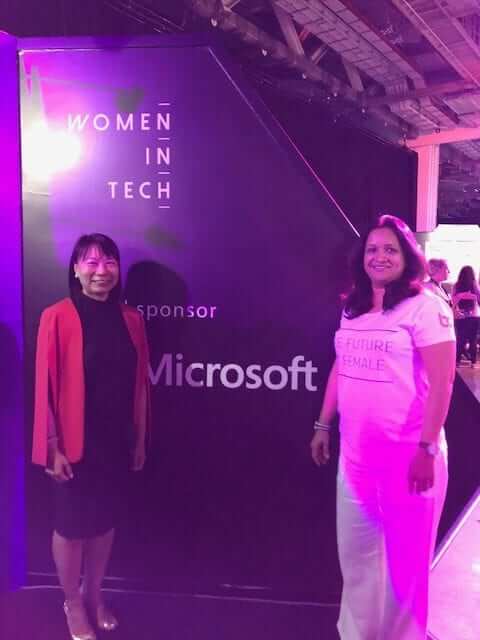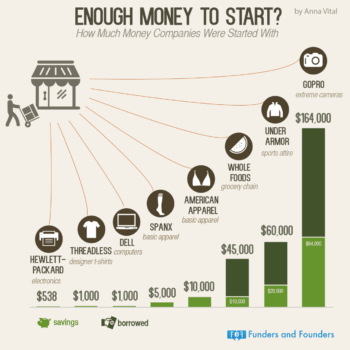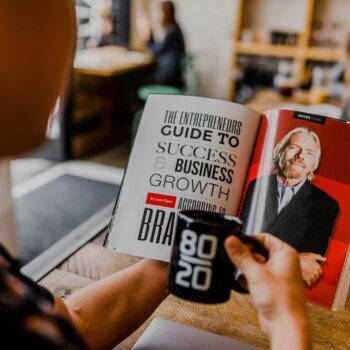Lathika S. Pai, Country Head, Microsoft for Startups, MENA and SAARC, was a speaker at Women in Tech Conference (Asia); a supercharged platform that brings together Asia’s leading female innovators, celebrating diversity in Science, Technology, Engineering and Mathematics
What resources you know that are out there to support women as they grow start-ups?
I’ve been an entrepreneur now, four times around and I think what is missing for female founders is to have a very strong network where they can ask questions and get the support that predominantly male founders have access to either from their colleges or other networks.
I started SonderConnect with like-minded women from the corporate world to promote female founders -not necessarily in only technology founders but across the board. We have a female founder, Manjiri Bakre, Oncostem, who has created a cancer diagnostic marker with patents all over the world. She raised series-B funding. One of Sonder Fellows, Neha Satak, founder of Astrome, wants to send a few 100 satellites up. We have sustainability start-ups like Bare Necessities, AI-based styling services – StyleNook, organic super foods – Happy Healthy Me to name a few.
We have several such start-ups who are part of our cohorts. We want to help them through the tough times of being an entrepreneur. I know, because I have been there and the only thing that may help me scale my business is that support system. I had people who were around there who were willing to either open the door, be there for advice, and I keep saying when you knock your head against the wall, there is someone you can call and say “Ok, I really don’t know anymore. Do you know whether I should quit or continue?”
I have so many different demands on my time. You have to be a mother, you have to be a wife, you’re daughter-in-law, especially in our Asian countries. These are very important roles we need to play. Yet you also have to be the founder and CEO. So, there are a lot of challenges that we have and I think by creating a network which supports you through that phase of your entrepreneurial journey is probably much more critical than getting money. If you have that support and network, the money will come. We have proven this to be true. As we have had success with the founders we have worked with giving them access and connects to industry and investors.
Is it an all women mentor group or are there also men?
We have both men and women. The beauty about what I have realized, frankly, is that men are extremely supportive about working with female founders. They are as passionate as the female mentors that we have. So, I would say that there are supporters from the community at large.
How would a women startup find a way to be seen by someone like you or another mentor if they cannot be part of Sonderconnect?
Great question. I think what is really relevant is that women have to go be out there. They have to come for conferences like Women in Tech. I think Women in Tech is a phenomenal initiative that started. To bring people or women either in tech or interested in tech together. For any entrepreneur in the world, I would say – go out there meet people and network. One thing that women are very shy about doing is networking, which is what men beat us all the time.
Why is there an Old Boys Club?
There’s an Old Boys Club because they do things that they enjoy together, outside of work. So, I think for women, they need to do the same. Go to events that are relevant. Go meet people, exchange cards and go find someone and ask them “Would you be my mentor?” At most, they will say “No,” so you are not worse off from where you are started. If they say “Yes,” you got yourself a great mentor.
When we have women breakfasts at these events, some people have said “Why should we need a women breakfast? Why don’t the women just mingle with the general tech scene?” What is your take on that?
So, I posted an article on LinkedIn saying that the UN has a HeForShe movement. But I really believe that we need a SheForShe. Men have been doing this for centuries. They continue to do it. I think the mistake that women feel is that if you are a part of a women’s organization, you are alienating men. That’s not it. There are certain issues which we need to discuss and take it to the next level and it is okay to have an all women’s organisation.
In India, we have women executive leadership dinners. And it is only women, 15-20 of the top female leaders come together. We discuss how we can move the needle, and how we should all be participating in moving that needle. So, I think it’s absolutely necessary for us to have breakfast or dinner meets. I mean, one or two a year is not going to kill anyone. So, I think the women who tend to say “No, I don’t want to do it,” are apprehensive about how they are going to be perceived by their male counterparts. This holds them back in terms of wanting to be a part of an all women’s breakfast or a female executive leadership event. I keep saying we need more SheForShe.
It happens when I approach Technology Conference to host a women’s event or women’s breakfast. Some have said that it does not seem that women’s event(s) change or move the needle. Many insist that women should hang out more with the men and get things done.
I actually hear a bias to the “get things done” of meetings when there is also community belongingness to the women’s support and the group support that women need especially for many women who are coming to these conferences for the first time.
When I look at top leadership gurus that are celebrated online, they are all men, supposedly. And all my mentors have been men. But I would like to see a possibility of more woman visibility with such special interest groups – women in tech and women breakfasts at Tech events.
This is what I said when I spoke at the Women In Tech executive panel. I was saying that there are women out there. So, please don’t tell me there aren’t any women. There are female coaches, female leaders, females… in PhDs. I mean, literally, if I look at my 51 female founders at Sonder Connect that are out there, they are absolute rockstars, and young. I have a 37-year-old founder, Richa Kar who is a mentor to our fellow’s who raised 47 million dollars to start Zivame. In Bangladesh, we have Maliha Quadir, Founder of Ride Share Shohoz who has raised $20Million +.
Vaishali Kasture, who is my co-founder at Sonderconnect is a super woman. Vaishali has run 100 marathons, she was the MD at Goldman Sachs, and a partner at Deloitte and CEO of Experian India.
Sejal Shah Gulati another co-founder of SonderConnect is the President of the Harvard Business School Alumni and works at American Express.
I refuse to believe that there aren’t enough smart women out there. I think women must, must support the other women and get together. I feel very passionate about it.
I went in search of women founders for Women on Top in Tech series I write. From Thailand to the Middle East and Africa. I recruited local interns to find these start-up women founders. My intern said that it was so hard to get the Muslim women to say “Yes” to an interview. But we managed to get a few. One of them after the interview was given money by a foundation. They needed to go through me and told me they found her only from my interview. She was so surprised and thankful. But by herself, she wouldn’t have been found. When I asked my Thai interns, young women, to find start-ups women who are Thai. They told me they could not find any online even while using the Thai.
Next week, I am off to Dubai to conduct a workshop that the US department is running for 25 female founders from Pakistan and 25 from India. The profiles of the female founders from Pakistan are phenomenal. They’re Fulbright scholars. When I tell people that there are like 25 female founders from Pakistan. They are surprised. Then I say “Do you realise there are hundreds of them out there?”
I was in Sri Lanka last week, I met with female founders from Sri Lanka. I had 5 who were part of SonderConnect. So, I do not believe that there aren’t female founders. One of the things I personally do is a five-minute video interview of every female founder I worked with at SonderConnect. We put it on YouTube and it goes viral because of my platform. We all need to promote that there are female founders around the world.
The actual area that I am passionate about is the Global South. “What is the Global South?” people may ask.
I say “It’s not North America. It’s not Europe or Australia or New Zealand. It’s the rest of the world where we need to go and expand on.”
“What about your numbers?” they might ask.
“I don’t care because I want to work with a thousand female founders around the world.”
“What is the impact?” they might ask
“At an average, assume a million dollars for each one in terms of revenue.” That’s a billion dollars that are hitting the economy. Or even more. The valuation of that billion is going to be tens of billions.
The jobs created? At an average of 10 to 100 jobs. You are going to have anywhere between 10,000 to 100,000 jobs being created. So, the impact in terms of working with women entrepreneurs and getting them to scale their businesses, economically, worldwide, in every territory is going to be big.
“What can I do?” If I am a woman but I am not a start-up person, not a female founder; they’re not that keen. What would you suggest they can do to help the average (founder)?
The first thing is that do not be embarrassed by supporting other women. What happens is that there is a group of women who believe that supporting each other would somehow dilute how they are being perceived by men.
How so?
I think they get the tag of being a Feminist, they get the tag of being aggressive; just because they support other women. There is this misconception in which women are constantly trying to shake off. Which is perhaps the main reason why I am here is that of gender. I just mentioned this on stage. I said that all four of us who are out there, are out there not because we are women but because of what we have achieved.
Our merits, yes.
On merits; we are there because of our merits. You know, it’s great that we’re also women. What I tell people is that, if there is an average female who has been pushed into the position, I can find a whole bunch of average men who have been pushed into that position. So, why pick on the female who is in that position?
Are you into ratios? I believe at this point of our gender inequality, we have to actually put quotas
I definitely believe in quotas. I still walk into rooms where I’m the only female. Which is really, really astounding. So, when I went back from the US to India in 2002, I walked into the room with CEOs from the top IT companies in India. I asked them “What’s going on? Why am I coming into this room as the only female? I came in from the US where there are a lot more women.”
So, the point to make is that women tend to… again I would say this is a very cultural aspect of India that says that women tend to stop working three times in their lives.
Once when they have a baby, once when their child is in Standard 10th; and then to take care of adult parents. So, this is when I went back and said “Why don’t you give women time off and flexibility and open it out to men. If men want to take time off to be with their children?” They should. To help them support their child in Standard 10th. That is what many of the US companies do. Both men and women take time off. Coach these women through it and say you don’t have to stop full-time work.
If this is a period, they need 6 months of support, they can take… go part-time, get paid half, if that’s what they’re doing. But bring them back into full, you need to keep them and understand what the cultural challenges are. I’m not saying that I don’t care about them. We need to have policies that are friendly for women that will keep them in the workforce and bring them up to senior levels. So I totally believe that having at least a number that you’re pushing for and constantly looking for. That number, absolutely, totally helps.
What would you suggest that male leaders or males who are in the corporate sector do for their female counterparts?
I have been at Microsoft now for a few months. The one thing I must admit is that I am absolutely impressed with the male leaders in India who have made this an agenda item in terms of tracking the percentage. At leadership meetings, they actually talk about “This is my number and this is what I’m going to work on…” I see that at Microsoft today that there is diversity and there is an inclusion, in terms of females. I think diversity in terms of ethnicity is also very important. Bringing in the people of different abilities is a big agenda. So, I think Microsoft is doing a phenomenal job in terms of diversity and inclusion. And I am very, very proud. I am back in the corporate world after 17 years. I am very proud to be a part of Microsoft that supports diversity, and it is very clear to me that this is a big agenda.
To the women who want to be a start-up or women who are corporate but are still facing some sort of glass ceiling. What would you say to them?
I think women need to find other successful women and ask them how they have gone through their journey. Hopefully, you’ll find someone who is honest and tells you what their journey was like. Paying-it-forward is very, very important. Support other women. Again I go back to my SheForShe. The ones who want to be entrepreneurs should continue to go for conferences like Women in Tech. Tech Asia is a fabulous place to meet others, get ideas, go meet start-ups and say, “I want to be a part of your start-up’s founding team or I want to be a part of your team as you grow.”
Take that leap. That’s the most important part – taking the leap. Identifying and meeting people. I’m sure you’ll meet like-minded people.
I’ve travelled around the world and everywhere I’ve gone, it hasn’t been the colour of my skin, the way I speak or the way I look that has brought me to the right people. It is just the same energy that we have, the same value system that we have, that brings us together. So, whether it’s men or women I think that’s really, really important. I do not believe religion, colour, the creed is what brings us together. It is that we all have the same passion. So, you will find women who want to support women. You will find men who want to support women.
I’ve been very fortunate; I’ve had both. There are right people out there… Go find them.
If you’d like to get in touch with Lathika S. Pai , please feel free to reach out to her on LinkedIn: https://www.linkedin.com/in/lathika-pai-2281124/





























